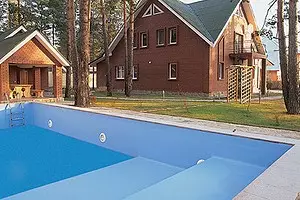
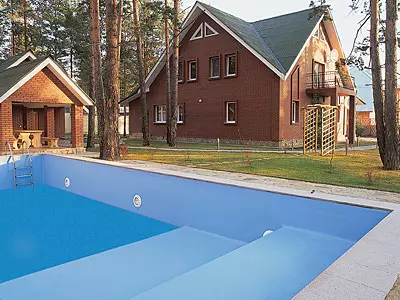
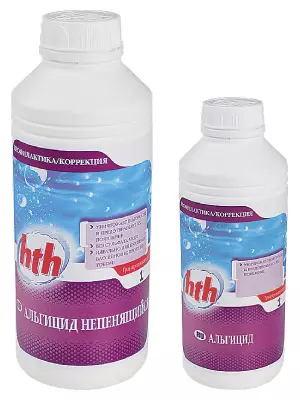
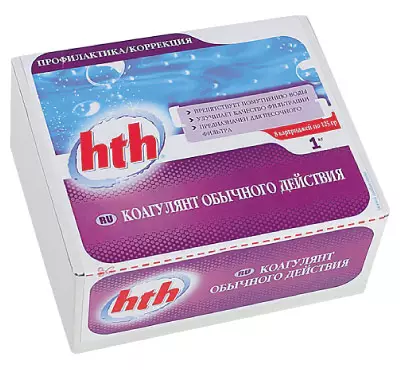
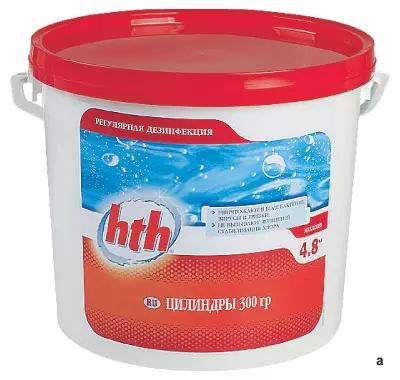
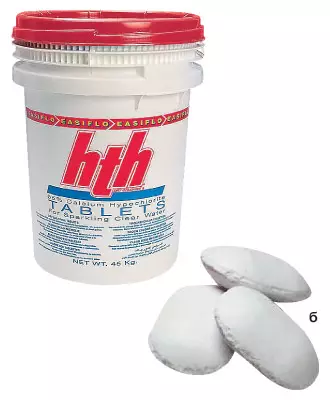
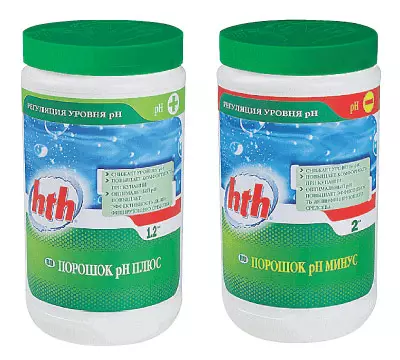
Creating a private pool, no one wants to ever turn into a busty swamp with algae, muddy water and a complete set of harmful microorganisms. Assistant, for him, one way or another, is careful - to measure forces, knowledge, free time and material wealth. Alone for disinfection of water, preparations are used with the content of so-called active oxygen, the second-PHMB polymer-based chlorhexidine (the use and other agents for three summer months for the 20m3 pool costs approximately 100), the third prefers products comprising bromine (more precisely, Bromochlordimethylhydantoin), the fourth practicing ozonation. Well, the fifth (and their overwhelming majority) choose chlorine in the old manner. This method of disinfection is reliable, tested by time (even now, in the 21st century, no other chemical has destroys bacteria as quickly as chlorine) and relatively cheap - for the same basin (20m3) on trimesulats will need preparations worth about 70. True, often supporters of chlorine disinfection complain that the water in their bathing is annoying eyes and skin and unpleasantly smelling "chlorine". By the way, for these reasons, the first four groups of consumers have generally moved to other disinfection technologies. What does it still appear in the eyes and suffers our sense of smell and is it only chlorine to blame? We asked to understand this issue we asked for specialists from Aquamaster.
"When chlorine is added to water, a chlorinous acid is formed (HOCL). As a powerful oxidizing agent, it destroys the pollutants very effectively. But the chlorine contained in it is rapidly spent on the suppression of bacteria that are entered into the water with swimsters (it is believed that each of them adds. "The pool is on average about 600 million bacteria!). In addition, chlorothic acid is unstable and partially decomposed in water. Moreover, the speed of this process depends on the pH level of the water in the tank (in order to prevent the decomposition of the acid, it is necessary to support pH within the limits of rigidly specified parameters. 7.0-7.4).
Hospitality, swimsters "enrich" water of the pool not only by bacteria, but later, mucus, urine IT.P. containing ammonia. As a result of its entry into the reaction with chlorine, such substances are formed as chloramines. The first of these monochlorams are stable at normal pH levels and practically harmless, however, from the point of view of water disinfection is absolutely useless. Avoid second-dichloramines (NHCl2) appearing in the interaction of monochlorains with all the same chlorinous acid, behave extremely aggressive, exactly they are irritated when bathing our eyes and give water an unpleasant smell. The paradox is that these "aggressors" are unstable at a normal PH level and easily decompose, provided that in the water of the pool there is a sufficient amount of chlorine (a reaction translating them into relatively harmless chemical compounds). If chlorine in water is not enough, then as a result of the entry of HOCl and NHCl2, the reaction is formed even more sharply smelling "irritant" - nitrogen trichloride (NCl3).
Thus, the main reasons for the appearance of irritations from users of the pool and an indous smell emanating from the water, two: organic chloramines, the raw materials for which the swimsters were brought in the water, and the lack of chlorine in water is simply not enough to "curb" the resulting There are strongest stimuli in it. "
This lesson chemistry was taught by experts. Insecurity will be happy. Maybe, before jumping out of the steam room, where it was in a pleasant company of the same lovers, and with a guicane and splashes with all the scope "to fluff" right into the pool, it is worth the shower first to take? And if the minimum concentration of free chlorine in the closed swimming pool should be 0.5 mg / l (for a street basin, in which chlorine must be protected from the destructive effects of sun rays using a special stabilizer, this value is 1 mg / l) - then let it be will be. Savings in this case can get out sideways. Asam Chlorine if something is to blame, then only partly.
